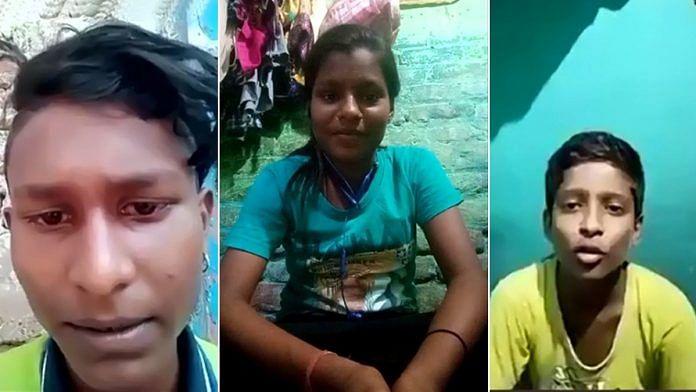New Delhi: Fourteen-year-old Payal lives in a shelter home in the national capital’s Sarai Kale Khan area with her five family members and dozens of other occupants. Every morning, she steps out for two hours, attends a Zoom class online, finishes her homework and comes back in to help her family with daily chores.
Payal is one of many children whose families have emigrated from other places to Delhi in the search of livelihood, and live in shelter homes, on the streets, in slums and resettlement camps.
A short distance away from Sarai Kale Khan is Valmiki Basti, a slum settlement, where Mohan lives in similar difficult circumstances. Mohan shares a small hutment with his mother and three siblings, works in a milk shop in the afternoons and attends online classes in the mornings.
Payal and Mohan are among the more fortunate schoolchildren in India, who are getting an opportunity to study even though schools have been shut since March due to the Covid-19 pandemic. They are among 350 children from the streets and from low income groups who are being taught by the non-profit Childhood Enhancement through Training and Action (CHETNA) in New Delhi.
CHETNA provides assistance by tutoring children online through Zoom classes, giving them homework on WhatsApp and even guiding them on phone calls whenever needed. The NGO also provides them basic stationery and books, and most importantly, pays for their internet connections every month.
Over 1,000 children are registered with CHETNA, including students from government schools as well as those from the National Institute of Open Schooling (NIOS). However, many of them were untraceable after the lockdown, and the organisation was finally able to trace 350 of them.
Sanjay Gupta, director of CHETNA, told ThePrint: “Our main objective is to help children with their studies and we do that by various means, like giving them stationery and books, tutoring them and even recharging their phones for internet access.”
Also read: Peeping parents, sleeping students, bullying — online classes are a nightmare for teachers
Overcoming challenges to study
ThePrint spoke to some of these children during one of their Zoom classes.
Payal, with other children peeping into the camera from behind her, said: “It is difficult for me to study with so many people around, so I go out of the shelter home, attend the class, note down the homework and come back in only after my work is done. I am just happy that I am able to study… two years ago, I used to beg and pick up waste from the road. So many other children I know are not even getting this opportunity.”
Payal, a student of class 8 at NIOS, uses her father’s phone to study, and CHETNA helps her with the internet recharge every month.
Shastri Camp resident Suraj, who was also on the call, said he wants to help his family of five by working, but his mother insists he should concentrate on his studies. His father leaves his phone behind when going to work, so Suraj doesn’t miss any classes.
“My parents support me, which is why I am able to study. But there are many boys in the neighbourhood who do odd jobs like polish shoes and work at tea stalls. They work the entire day; they have neither the time nor means to study,” said Suraj.
Of course, it’s not all hunky-dory. Some children have to share a single phone with three or four siblings, while others have to go to their neighbours’ houses amid the pandemic and use their phones.
Mausam, who lives in a slum in west Delhi, was excited to be talking about her school, but added: “I miss school and my friends, but I am happy with the online classes. We have just one phone at home, which my two siblings and I use for our studies. We divide time; everyone gets two hours with the phone.”
Mausam’s friends, who do not have a smartphone at home, depend on the weekly homework that their schools give them. Many government schools in Delhi call children to school once a week and give them a week’s homework. The work sheets are submitted the next time they go to school.
Even though the central government has permitted partial re-opening of schools, allowing children from classes 9 to 12 to attend school for guidance, many parents and teachers are not in favour of re-opening. In the absence of physical classes, studies are likely to go on in partial mode in the coming months.
Also read: How a letter for better online classes for disabled students got lost between two ministries



